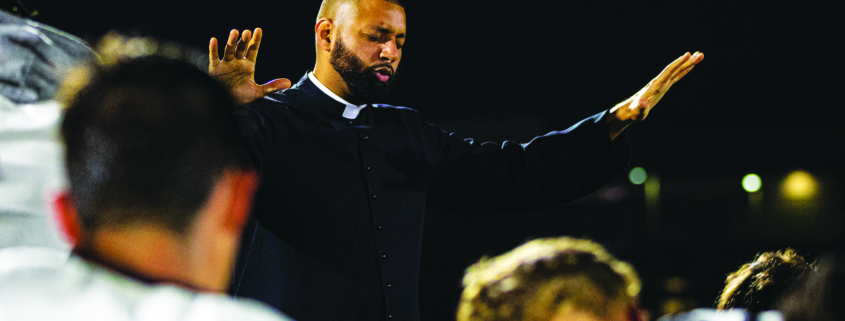Sport Is More Than a Game for Catholic Schools
In Catholic education, athletes like to win competitions as much as anyone else—but sport has an even higher purpose that should take priority for students and coaches.
Sport done rightly aids the development of character and virtue. Catholic sport allows for the integral formation of body and soul, to work toward the fulfillment of athletic and intellectual prowess and excellence. Sport builds school community, reinforcing bonds among students and between students, faculty and staff. Sport forges bonds among parents and the larger community.
Sport in Catholic education is not only for the physically talented. Because it has so much to offer the human person, all capable students should have the benefit of participating in athletics and sporting competitions. What student hasn’t missed catching or hitting a ball? It’s not only about learning handeye coordination, but also about how to emotionally respond and behave in a way that leads to virtue formation.
ALL CAPABLE STUDENTS SHOULD HAVE THE BENEFIT OF PARTICIPATING IN ATHLETICS.
As stated in The Cardinal Newman Society’s new standards on sports in Catholic education, a Catholic institution should be concerned not only with “physical skills and strength” but also developing social skills and “Christian character and virtue.” The standards discuss the outlook of Pope St. John Paul II, who spoke of the importance of sport in the development of the human person as well as the danger if sport is simply “reduced to mere effort and to a questionable, soulless demonstration of physical strength.”
Sport can help students recognize their physical and mental capacities and limitations. For some, it’s the acceptance of their skill; for others, it’s the determination to improve, which motivates them to understand who they are or who they are called to be.
Some believe gender is a social construct, and that athletic policies should invite students who express a gender different from their biological sex (“transgendered athletes”) to compete alongside or against athletes of a different biological sex. But science tells us there are chromosomes within each human person that exist at conception defining one’s sex as either male or female. The Church teaches that the human person grows as a unified body and soul, not as “two natures united, but a single nature” as male or female. As our standards explain, “Through integral and holistic Catholic education, student-athletes will Sport Is More than a Game for Catholic Students NEWMAN SOCIETY EDITORIAL come to understand who they are as unified persons of body and soul [and] as sons and daughters of God.” Sport can be important to upholding the perennial teachings of the Church and the mission of the Catholic school or college.
Catholic institutions of integrity will recognize natural law and Catholic teaching, refusing to capitulate to contemporary ideologies that negate the basic binary principle of human sexuality. Faithful Catholic institutions will participate in like-minded athletic associations or sports leagues that do not usurp the rights of students to compete with students of the same biological sex. This is a matter of justice. Our standards state, “By nature, men are typically bigger, faster and stronger than women and so should not play against them in competitive interschool athletics.” Any athletic competition should protect the safety and dignity of all participants.
It is important that educators ensure that students are not degraded by unsportsmanlike behavior, such as name-calling or hazing, and “coaching that is physically, emotionally or spiritually abusive, harmful or degrading.”
Sport in a Catholic school is the extension of the school’s academic and religious mission—to transform students into persons who will live their earthly and eternal lives as humble servants of God. It should be seen as an evangelical and formative program.

